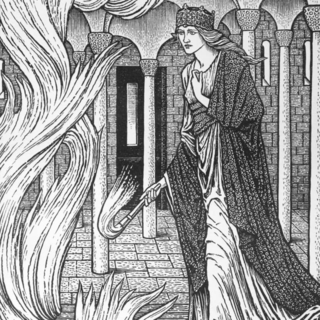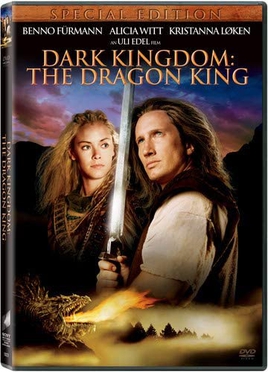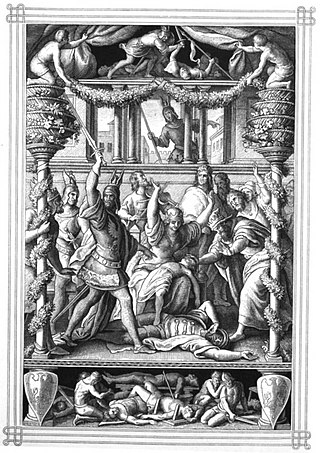
The Nibelungenlied, translated as The Song of the Nibelungs, is an epic poem written around 1200 in Middle High German. Its anonymous poet was likely from the region of Passau. The Nibelungenlied is based on an oral tradition of Germanic heroic legend that has some of its origin in historic events and individuals of the 5th and 6th centuries and that spread throughout almost all of Germanic-speaking Europe. Scandinavian parallels to the German poem are found especially in the heroic lays of the Poetic Edda and in the Völsunga saga.

Brunhild, also known as Brunhilda or Brynhild, is a female character from Germanic heroic legend. She may have her origins in the Visigothic princess and queen Brunhilda of Austrasia.

Gudrun or Kriemhild is the wife of Sigurd/Siegfried and a major figure in Germanic heroic legend and literature. She is believed to have her origins in Ildico, last wife of Attila the Hun, and two queens of the Merovingian dynasty, Brunhilda of Austrasia and Fredegund.

In German heroic legend, Alberich is a dwarf. He features most prominently in the poems Nibelungenlied and Ortnit. He also features in the Old Norse collection of German legends called the Thidreksaga under the name Alfrikr. His name means "ruler of supernatural beings (elves)", and is equivalent to Old French Alberon or Auberon.

Hagen or Högni is a Burgundian warrior in Germanic heroic legend about the Burgundian kingdom at Worms. Hagen is often identified as a brother or half-brother of King Gunther. In the Nibelungenlied he is nicknamed "from Tronje".

Gundaharius or Gundahar, better known by his legendary names Gunther or Gunnar, was a historical king of Burgundy in the early 5th century. Gundahar is attested as ruling his people shortly after they crossed the Rhine into Roman Gaul. He was involved in the campaigns of the failed Roman usurper Jovinus before the latter's defeat, after which he was settled on the left bank of the Rhine as a Roman ally. In 436, Gundahar launched an attack from his kingdom on the Roman province of Belgica Prima. He was defeated by the Roman general Flavius Aetius, who destroyed Gundahar's kingdom with the help of Hunnish mercenaries the following year, resulting in Gundahar's death.

The term Nibelung (German) or Niflungr is a personal or clan name with several competing and contradictory uses in Germanic heroic legend. It has an unclear etymology, but is often connected to the root Nebel, meaning mist. The term in its various meanings gives its name to the Middle High German heroic epic the Nibelungenlied.
Brunhilda was queen consort of Austrasia, part of Francia, by marriage to the Merovingian king Sigebert I of Austrasia, and regent for her son, grandson and great-grandson.

Der Rosengarten zu Worms, sometimes called Der große Rosengarten to differentiate it from Der kleine Rosengarten (Laurin), and often simply called the Rosengarten, is an anonymous thirteenth-century Middle High German heroic poem in the cycle of Dietrich von Bern. The Rosengarten may have been written as early as before 1250, but is securely attested by around 1300. It is unclear where it was written.

Dark Kingdom: The Dragon King is a 2004 German television film directed by Uli Edel and starring Benno Fürmann, Alicia Witt, Kristanna Loken and Max von Sydow. The film is based on the Norse mythology story Völsungasaga and the German epic poem Nibelungenlied, which tells the mythological story of Siegfried the Dragon-Slayer. Richard Wagner's music dramas Siegfried and Götterdämmerung are based on the same material. Dark Kingdom: The Dragon King was written by the husband and wife team of Diane Duane and Peter Morwood and is a Tandem Communications production. It was filmed entirely in South Africa.

Walter or Walther of Aquitaine is a king of the Visigoths in Germanic heroic legend.

Die Nibelungen is a two-part German series of silent fantasy films created by Austrian director Fritz Lang in 1924, consisting of Die Nibelungen: Siegfried and Die Nibelungen: Kriemhild's Revenge.

Sigurd or Siegfried is a legendary hero of Germanic heroic legend, who killed a dragon—known in some Old Norse sources as Fáfnir—and who was later murdered. In both the Norse and continental Germanic tradition, Sigurd is portrayed as dying as the result of a quarrel between his wife (Gudrun/Kriemhild) and another woman, Brunhild, whom he has tricked into marrying the Burgundian king Gunnar/Gunther. His slaying of a dragon and possession of the hoard of the Nibelungen is also common to both traditions. In other respects, however, the two traditions appear to diverge. The most important works to feature Sigurd are the Nibelungenlied, the Völsunga saga, and the Poetic Edda. He also appears in numerous other works from both Germany and Scandinavia, including a series of medieval and early modern Scandinavian ballads.

Die Nibelungen is a 1966/1967 West German fantasy film released in two parts, Siegfried von Xanten and Kriemhilds Rache. It was directed by Harald Reinl and produced by Artur Brauner. Die Nibelungen starred Uwe Beyer, Karin Dor and Herbert Lom. The two films were a remake of Fritz Lang's 1924 silent classic Die Nibelungen, which was in turn based on the epic poem the Nibelungenlied.

The Dragon's Blood is a 1957 Italian fantasy film co-written and directed by Giacomo Gentilomo. It is based on Richard Wagner's Der Ring des Nibelungen.

Volker von Alzey is a legendary figure from the Nibelungenlied. He is the minstrel at the court of Burgundy in Worms. His headquarters Alzey is located about 20 kilometres (12 mi) from Worms. Volker is one of the Burgundian knights and heroes. He dies at Hildebrand's hand with the other Burgundians fighting alongside Hagen at King Etzel's castle.

Biterolf und Dietleib is an anonymous Middle High German heroic poem concerning the heroes Biterolf of Toledo and his son Dietleib of Styria. It tells the tale of Biterolf and Dietleib's service at the court of Etzel, king of the Huns, in the course of which the heroes defeat Etzel's enemies, including an extended war/tournament against the Burgundian heroes of the Nibelungenlied. As a reward for their services, Dietleib and Biterolf receive the March of Styria as a fief. The text is characterized by its comedic parody of the traditions of heroic epic.

Das Lied vom Hürnen Seyfrid, or Hürnen Seyfrid for short, is an anonymous Early New High German heroic ballad. The poem concerns the adventures of young Siegfried, hero of the Nibelungenlied and an important figure in Germanic heroic legend. It preserves traditions about Siegfried that are otherwise only known from Old Norse sources and thus attest their existence in oral traditions about Siegfried that circulated outside of the Nibelungenlied in Germany.
Die Nibelungenklage or Die Klage is an anonymous Middle High German heroic poem. The poem describes the laments for and burial of the dead from the Nibelungenlied, as well as the spread of the news of the catastrophe that ended the other poem, and the fates of the various characters who survived. It was likely written at around the same time as the Nibelungenlied, and is appended to it as though it were another episode (âventiure).

Ortlieb is the son of Kriemhild (Gudrun) and Etzel (Atli) and a minor figure in Germanic heroic legend and literature.


















